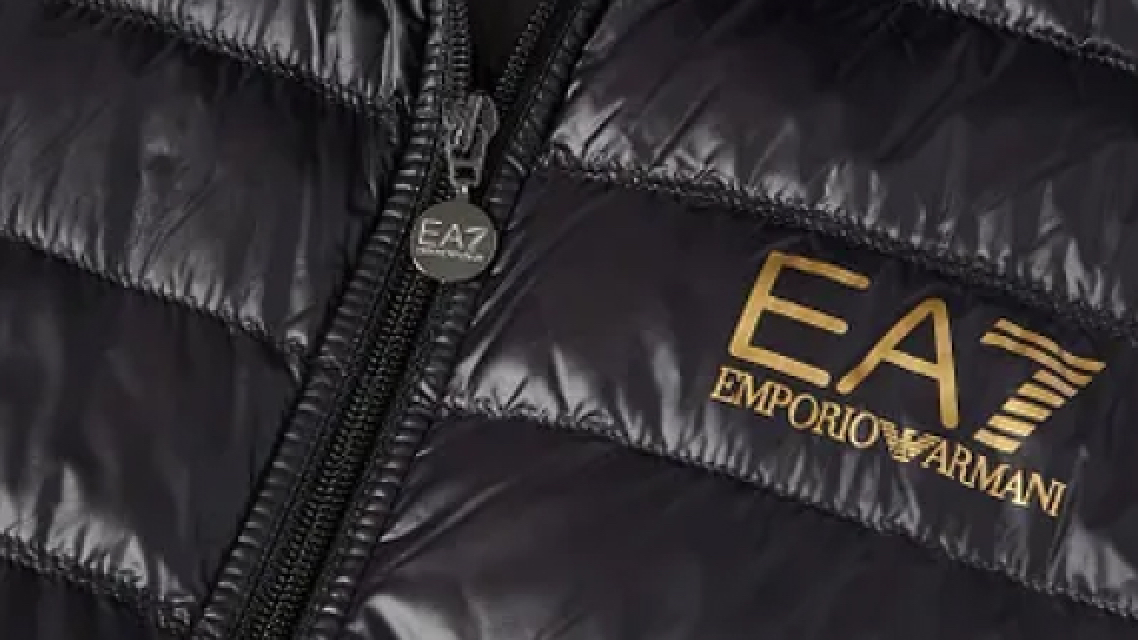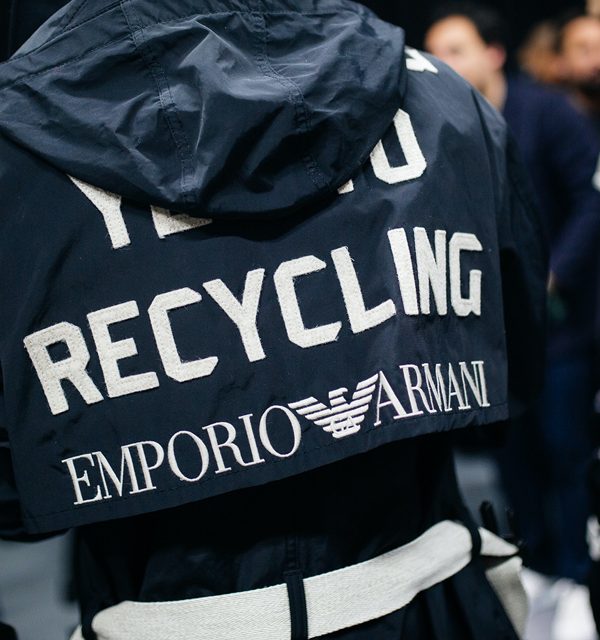The Group’s commitment to research in this sector dates back decades, to the launch of the first recycled denim jeans in 1996 that were exhibited at the Innovation Fair at Milan’s Museum of Science and Technology that same year.
Products
Waste Management
The Armani Group is committed to implementing circular economy policies regarding its products and materials. Unsold products and unused materials are reused, recovered and recycled.
Among the initiatives accomplished, social enterprises are provided with the Group’s leftover stock inventories to train and support their employees belonging to vulnerable categories. In this way, they are given the opportunity to improve their skills and find dignity in their work. Regular updates with the suppliers are also organized in order to implement circular projects.
Materials Research
With the goal of minimizing industrial waste and reducing its environmental impact, the Armani Group has intensified its research aimed at using materials of organic origin obtained through recycling or regeneration, as well as second-generation raw materials.
Subsequently, denim scraps from industrial manufacturing were blended with regenerated leather, organic cotton, polyester obtained from recycled plastic bottles and nylon made from recovered abandoned fishing nets.
The Armani Group’s brands are committed to the selection of sustainable raw materials through the increasing use of recycled and organic materials.
In 2021, the Group also drafted the Sustainability Requirements for Raw Materials and Production Processes. These updated guidelines replace the previous version and integrate it with new protocols, standards, and sustainability certifications.
In particular,
- they provide instructions for each type of material and are a reference for internal departments – from design, research and development, to manufacturing and merchandising – and for suppliers;
- they refer to “preferred materials”, according to the definition of Textile Exchange: “A fiber or raw material that delivers consistently reduced impacts and increased benefits for climate, nature, and people against the conventional equivalent, through a holistic approach to transforming production systems”;
- they take into account and often go beyond international standards.

Emporio Armani Sustainable Selection
2023
The Emporio Armani sustainable collection for Spring/Summer 2023 is the result of a research project and precise commitment that stems from a collaboration with all suppliers involved, aimed at reducing the overall environmental impact.
The collection supported Artisan Fashion Est 2009 / Handmade in Africa, the first social enterprise of the United Nations Ethical Fashion Initiative in sub-Saharan Africa. Thanks to this project, local artisans, mostly women, were able to receive a fair wage thus improving their quality of life, making a positive impact on the entire community.
All details can be accessed through a digital ID, enabled by a QR code that accompanies every garment.

Armani/Dolci
2021
The Armani Group evaluated the environmental impact of its Armani/Dolci Autumn 2021 collection (Limited Edition) to improve its environmental and social performance in this area, as well.
The study of its Carbon Footprint was verified by an independent third party, with the results conforming to ISO Standard 14067:2018, which is used to measure greenhouse gas emissions produced during the entire life cycle of products under review.
Emporio Armani Eyewear
2021
The Spring/Summer 2021 Emporio Armani Eyewear collection reflects the brand’s commitment to sustainability through the use of recycled, low-impact materials for its eyewear and packaging, as well as its communications. Its advertising campaign was shot in Milan, obtaining an EMA Gold Seal Green certification from the Environment Media Association for being shot in a sustainable way and conserving a considerable number of resources, with a resulting reduction of greenhouse gas emissions.
The campaign achieved carbon neutrality by mitigating its environmental impact though its support of the Agrocortex REDD + Project, which aims to protect a large section of the Amazon rain forest from deforestation, helping reduce CO2 emissions into the atmosphere by 14 million tons over the next 30 years. This initiative also aims to safeguard biodiversity in an area particularly rich in animal species.
Emporio Armani Recycled Collection
2020
This non-stop pursuit led to the creation of the Emporio Armani Recycled Collection, a selection of clothing and accessories made from recycled, regenerated and organic materials, which was part of the Emporio Armani Autumn/Winter 2020/21 Collection.
Bags, backpacks and other small accessories crafted from regenerated leather were also introduced during the Spring/Summer 2019 and 2020 seasons.

Armani/Casa Pollock Collection
2020
As a demonstration of its across-the-board use of raw materials with a low environmental impact, Armani/Casa launched the Pollock collection, which gives new life to scraps generated during the internal manufacture of Armani/Casa fabrics by using them to cover high-quality Made-in-Italy notebooks, crafted completely using paper from FSC-certified sources.

Giorgio Armani Beauty Fragrance My Way
2020
The Beauty segment reflects Giorgio Armani’s commitment to protecting the environment and fighting climate change with the launch of the My Way fragrance in September 2020. For the first time in the perfume industry, a recyclable, refillable glass bottle was designed for use.
In addition, the fragrance’s natural ingredients are harvested responsibly through programs based on the principles of fair trade.

The EA7 Ecodown® Jacket
2019
For the Autumn/Winter 2019 season, EA7 launched a padded puffer jacket made from Ecodown® fibre, produced by Thermore from PET bottles. This simultaneously avoided the use of animal down, while giving a second life to single-use plastic bottles.
 © Giulio Ciamillo
© Giulio Ciamillo
Olimpia Milano Jersey in re-PET
2018
The first Olimpia Milano team jersey was launched on Earth Day 2018. It was created using a technical fabric obtained from recycled plastic bottles (re-PET) and definitively adopted by the team to demonstrate its commitment to a matter of fundamental importance.

A|X recycled materials
2018
Armani Exchange’s commitment to increasing its use of organic and recycled materials can be clearly seen through the regenerated nylon originating from post-use recycled plastic used for outerwear. Organic cotton, along with recycled cotton and denim, are often used together in the creation of knitwear and denim.
